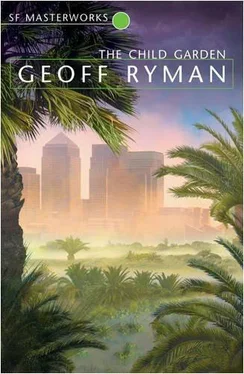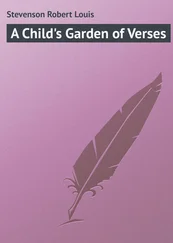Then something roared into her, blasting her with imagined music. The lines shook with it. It picked Milena up and swung her round and round, and roared even louder, with the sound of many voices in unison, the sound of flutes like knives, of sopranos like steam whistles.
And where it held Milena, there was a sputtering of memory, of lanolin smells of rotting teeth, of hair in ears, of strong, smooth air playing cords of flesh like the strings of a violin, and of a voice as strong as heaven humming in the bones of the cheeks and the sinuses.
The pattern of Rolfa caught Milena up and embraced her. It entered her and interpenetrated her. The pattern of their nerves, of their lives settled into each other. The lines jumped with impulses, releasing memory, exchanging recognition and yearning and fulfilment. They bathed in each other, crackling with memory, part of the universe, made of the forces of attraction. Milena, whose name meant Loving One became one with the one she loved.
Go! Go! Go! cried the spirit of the flesh on the floor.
Rolfa and Milena rose up the Slide. The Slide hummed with Angel being, like voices in a chorus. The Angels sang no words. They played the wires and were the wires. They sang the song and were the song. Music had only ever imitated it, as if catching an echo.
Rolfa imagined music. She imagined the end of Purgatorio. She imagined stars falling like rain, splattering water onto both her and Milena. Milena could see the rain in memory, and she could feel it wash over her.
Eunoe whispered Rolfa. The water that washes and restores the memory of the good.
Words were sung in imagination:
Ma perche piene tutte le carte
But since all the pages
ordained for this second song are filled,
the rules of art now curb me
and let me go no further
Milena swirling within and outside the song felt the stars that pulled them and she felt the Slide, sliding through her. She felt the universe, its threads stretched tightly as if on a loom. She was the shuttle.
The universe pulled, aching to embrace, yearning to haul all things together and hold them. The lines had pulled apart nothingness, stretching nothing into tiny, blazing vortexes, the energy called matter. Energy and matter were one, and both were made of the yearning, the ache in the heart that is creation.
The Earth fell away beneath them, the moon half hidden behind it. The rocks and the soil, the plants and the mammals, the stars themselves all whispered in gravity. The stars and the Earth were alive, too. They very nearly thought. Their voices were like something half-heard on a radio, sputtering and meaningless, but trying, trying to speak.
We rose out of them as Life because they needed us to. They needed us to see and to speak. Everything, even hate, was made of love.
Io ritornai da la santissima onda
I returned from the sacred water
made whole, as are the trees made new with leaves
pure and ready to rise to the stars.
The Second Book was finished, and the Third could begin.
On the floor, the flesh that was Milena Shibush remained behind. Mike Stone gazed in love and wonder at her face. Piglet held his hand and walked forward on newly imagined, newly living legs and leaned shyly over her. The face of Milena Shibush was ablaze with a smile of purest joy. The spirit saw the smile too. Her whole body was ablaze with the brightest fire, as if she were translucent, glass, illumined from within.
In her hand, she could still feel Jacob’s crucifix. Somehow the chain had broken. The hand reached up, blindly groping. The crucifix was enfolded in Mike Stone’s hand, passed on.
Milena thought of them all, Mike and Root, Lucy and Old Tone, the Babes. She thought of Thrawn and Rose Ella. The flesh on the floor was smiling at the whole of her life, at the panoply of it. It had ended in freedom after all.
For the last time all the many selves of Milena Shibush were united. My turn now, thought the spirit. Like the Consensus, she was a framework to be emptied.
Milena died.
She settled into the silence and was divided. All her separate selves were freed: the infant and the child, the orphan in the Child Garden, the actress and the director, the wife and the People’s Artist, Milena the Angel, Milena the oncogene, Milena who carried the Mind of Heather, and the Milena who remembered Rolfa.
They rose up like the white pages of a written speech thrown to the winds. The pages blew like leaves, were scattered to their individual and eternal Nows. The Nows were no longer linked by time or by a self. They went beyond time, to where the whole truth can be told. It takes forever to tell the truth, and it is bound into one volume by love. That is the third book, beyond words or low imagining. Leaving Purgatory will have to be comedy enough.
But that is not the end. There is no such thing as an end.
It was still Easter in Czechoslovakia, and Loving One was climbing a hill with her parents, through a wood.
She was still dressed as an angel. She wore a star and wings covered with crinkled resin. She was very tired, but her parents swung her between them through the air. It was as if she were flying.
The slope of the hill became less steep, and there was more light: Loving One was swung out onto the top of the hill, where the larches stood bolt upright like the tails of squirrels. She looked about her and squealed with delight.
At the top of the hill there was her home. There was the lipy, her lime tree and the hot white limestone house. The child broke into a run, shrieking with glee, into her field, over the grass that seemed to have hands and elbows, through the grass that seemed to part like a smile. Tatinka, Maminko, ghost-names ran laughing with her. There was the light flowing, there were the birds. The gates to the garden had been left hanging open.
The gates would be left hanging open in each moment, here, now, in Czechoslovakia or in England. Always.
THE END
SF writer Geoff Ryman was born in Canada in 1951, went to high school and college in the United States, and has lived most of his adult life in Britain.

His longer works include The Unconquered Country, the novella version of which won the World Fantasy Award in 1985; The Child Garden, which won the Arthur C. Clarke Award and the John W. Campbell Memorial Award in 1990; the hypertext novel 253 , the “print remix” of which won the Philip K. Dick Award in 1999; and Air , which won the Arthur C. Clarke and James Tiptree, Jr. Awards in 2006.
An early Web design professional, Ryman led the teams that designed the first web sites for the British monarchy and the Prime Minister’s office. He also has a lifelong interest in drama and film; his 1992 novel Was looks at America through the lens of The Wizard of Oz and has been adapted for the stage, and Ryman himself wrote and directed a stage adaptation of Philip K. Dick’s The Transmigration of Timothy Archer .













